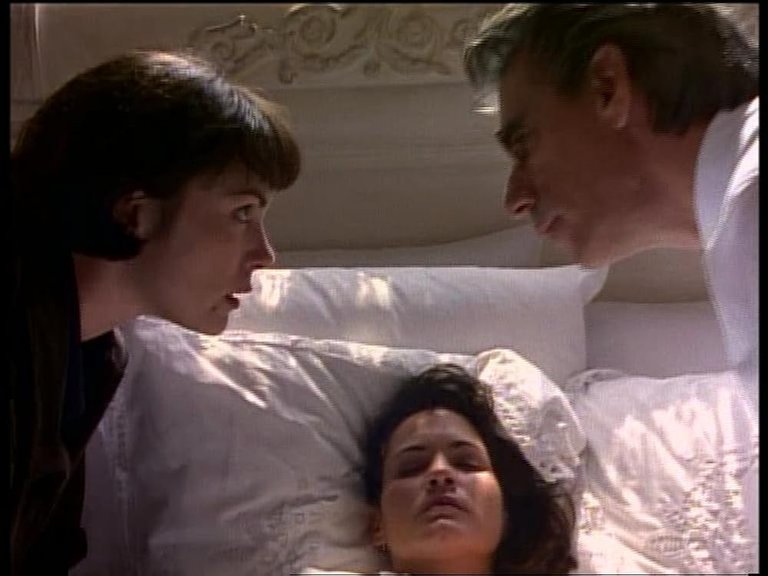Television Review: White Lies (Homicide: Life on the Street, S5X06, 1996)

White Lies (S05E06)
Airdate: 8 November 1996
Written by: Anya Epstein
Directed by: Peter Weller
Running Time: 46 minutes
Even in its fifth season, Homicide: Life on the Street remains unflinching in its dissection of moral ambiguity within Baltimore’s unforgiving urban landscape. The series has long thrived on probing the murky boundaries between right and wrong, where ethical clarity is often sacrificed to survival, loyalty, or compassion. White Lies, penned by Anya Epstein, sharpens this focus, interrogating the notion that fiction—whether through omission, deflection, or outright deceit—can be a refuge for ostensibly virtuous characters when truth risks inflicting irreparable harm. The episode’s title is both literal and metaphorical, threading through its narratives as detectives, suspects, and bystanders alike navigate the consequences of their choices in a world where honesty is rarely a virtue.
At the heart of the episode lies Detective Mike Kellerman’s (Reed Diamond) spiralling confrontation with his past in the Arson Unit. A damning Baltimore Sun exposé drags his name into a federal corruption investigation, implicating him alongside former colleagues, with Mitch Roland (Stephen Lejnar), a real estate developer with whom Kellerman shares a fraught history. Kellerman’s outrage at the allegations—a mix of wounded pride and genuine indignation—fuels a volatile confrontation with Roland, whom he accuses of offering bribes. The scene crackles with tension, teetering on physical violence until federal prosecutor Gail Ingram (Rebecca Boyd) intervenes, revealing Roland’s status as a protected witness. Kellerman’s defiance, rooted in a rigid code against “ratting” on peers, becomes both his shield and his shackle: he passes a polygraph test by denying personal corruption but refuses to implicate others, leaving his future in limbo. The standoff culminates in a taut stalemate—both men cleared by polygraphs, yet one undeniably lying—a fitting metaphor for the show’s central thesis: truth is often less about facts than perception, and justice is rarely blind.
Parallel to Kellerman’s turmoil is the ostensibly routine death of Nina Engle (Erin O’Donnell), a young woman discovered by her husband Philip (Scott Bryce) in their home. Detective Munch (Richard Belzer), ever the cynic, senses deception in Philip’s demeanour and inconsistencies in the scene. His suspicions, however, are initially dismissed by Dr. Cox (Michelle Forbes), the medical examiner, who rules the death a heroin overdose. When Philip later confesses to tampering with evidence to spare his wife posthumous shame the revelation forces a reckoning with the ethics of his lie. Is preserving dignity a noble act, or merely a self-serving facade? Munch’s frustration with Cox’s clinical detachment underscores the show’s broader tension between cold procedure and human empathy, while Philip’s moral compromise mirrors Kellerman’s: both men cling to codes of honour that demand bending the truth.
Frank Pembleton (Andre Braugher), temporarily relegated to desk duty, inserts himself into a cold case run by his former partner Detective Bayliss (Kyle Secor). Their dynamic lays bare Pembleton’s existential struggle—a once-formidable interrogator now sidelined, his identity tethered to the “Box.” His mentorship of Bayliss, though laced with impatience, exposes the latter’s inadequacies in extracting confessions, a shortcoming Pembleton views as symptomatic of generational decline in policing rigour.
The ongoing arc of Brodie’s (Max Perlich) homelessness takes a poignant turn when Detective Howard (Melissa Leo) arranges temporary shelter for him with a young female colleague. Brodie’s refusal, driven by a mix of pride, unrequited feelings for Howard, and fear of workplace gossip, underscores the fragility of dignity in the face of vulnerability. His choice—to endure hardship rather than risk pity or scandal—echoes Philip Engle’s and Kellerman’s dilemmas, framing self-imposed suffering as a perverse form of integrity.
White Lies is not without flaws. The subplot involving leaked grand jury details strains credibility, painting federal prosecutors as recklessly unprofessional—a rare misstep in a series otherwise lauded for its gritty realism. Similarly, Kellerman’s near-brawl with Roland veers into melodrama, though Reed Diamond’s layered performance salvages the scene with a mix of rage and wounded idealism.
Director Peter Weller, better known for his acting roles, delivers a taut, claustrophobic aesthetic, leveraging close-ups and muted lighting to amplify the episode’s moral tension. The promotion of Dr. Cox to a regular character proves a masterstroke; Michelle Forbes imbues the role with steely authority, her clinical precision a counterpoint to the detectives’ emotional volatility.
White Lies ultimately succeeds by refusing easy answers. It posits that lies, whether selfless or self-serving, are often the currency of survival in a world where absolute truth can destroy lives as readily as it liberates them. While the episode occasionally falters in its pursuit of drama, it reaffirms Homicide’s enduring strength: its ability to weave personal morality tales into the broader tapestry of institutional decay, leaving viewers to ponder whether the lies we tell are acts of cowardice—or, perhaps, the only kindnesses we can afford.
RATING: 6/10 (++)
Blog in Croatian https://draxblog.com
Blog in English https://draxreview.wordpress.com/
InLeo blog https://inleo.io/@drax.leo
Hiveonboard: https://hiveonboard.com?ref=drax
Rising Star game: https://www.risingstargame.com?referrer=drax
1Inch: https://1inch.exchange/#/r/0x83823d8CCB74F828148258BB4457642124b1328e
BTC donations: 1EWxiMiP6iiG9rger3NuUSd6HByaxQWafG
ETH donations: 0xB305F144323b99e6f8b1d66f5D7DE78B498C32A7
BCH donations: qpvxw0jax79lhmvlgcldkzpqanf03r9cjv8y6gtmk9
Posted Using INLEO